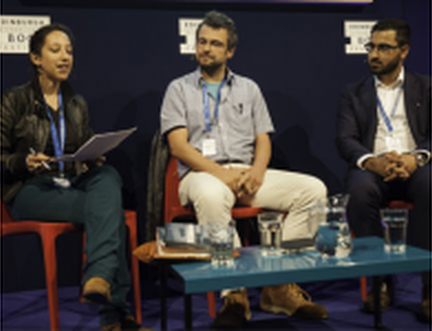More articles Friday 19 August 2016 6:30pm
Stories of War, Flight and Refuge at the Book Festival

Gulwali Passarlay and Wolfgang Bauer both have first-hand experience of the chaotic and perilous routes taken by refugees from the Middle East to Europe. Passarlay was a mere twelve years old when, trapped “between a hard place and a rock” of being recruited as either a Taliban fighter or a US army informer, he travelled through eight countries over twelve months in order to reach the UK. Bauer, a German reporter, went undercover with Syrians leaving their war-torn state, as he relates in his book Crossing the Sea: With Syrians on the Exodus to Europe.
“Everything you have done in your old life is minor,” Bauer told the Book Festival audience. “What is important now is your talent to make your way through all the obstacles – daily survival, and nothing else.”
“I had a beautiful life, and I wished to continue that life,” said Passarlay. He has not seen his mother for ten years but, he said, “My mother saved my life, but also lost me. You would not send your children away for no reason. It has to be an extraordinary circumstance.” On his journey he passed through the dubious care of twenty-five “agents”, or people smugglers. “You’re under their mercy – under their control,” he said. “They could not have cared less about me. You’re seen as a commodity. It’s a huge business.” And although he has proved a high achiever since securing his refugee status – he’s just graduated in politics from Manchester University, as well as authoring a book on his life, The Lightless Sky - shame still taints his story. “I feel ashamed – it’s not manly to run away. But my mother did not want to bury another of her loved ones.”
Bauer also experienced shame - that of an impostor. To get close to the experiences of Syrian refugees, he and his photographer forged a cover story of English teachers fleeing relationship problems in Azerbaijan. "It was a humiliating situation - they were friends to us, and still we needed to lie to them." In order to speak without being suspected, the pair even made up a language, which, Bauer said, “was quite a headache.”
He expressed the opinion that far from Iraq providing a warning against military involvement in Syria, “if intervention in Iraq was a crime, so is non-intervention in Syria.” He also questioned why governments had not forged an agreement to accept refugees from Syria, similar to that which permitted refuge to those fleeing that war in Sarajevo. He blamed the differing approach on “open racism in Europe – double standards and discrimination.” The winners, meanwhile, are the people traffickers. “The criminality is there because the governments allow it to be,” he argued. “The higher we raise our walls the more people will be killed and the more smugglers will earn. We won’t stop people coming; they will just get more determined and more street smart.” Most importantly, however, he emphasises the positive side of accepting refugee. “These people are not a burden. They are the hope for our countries.”
Passarlay emphasised his gratitude to his new home. “I wake up every morning wanting to give something back to Britain,” he said. But he was fierce in his agreement that refugees must not be blamed or dehumanised. “It’s not my fault that I wasn’t born here, that I was born in a war zone. And Britain had a role in making Afghanistan into a war zone.” Politics, however, were less important than shared humanity, he said. “You shouldn’t solve the problem because refugees are coming. You should solve it because it’s the right thing to do.” He ended on a note of hope. “Humans generally are kind and want to help. We should not lose hope. I always feel proud when I come to Scotland, because of the way the Scottish government has led on refugees.”

 Major new partnership with Celtic Connections
Major new partnership with Celtic Connections 

